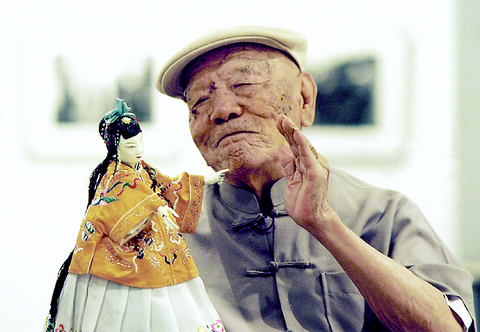Legendary Taiwanese puppet master Huang Hai-tai (
Relatives said Huang died at his home in Yunlin County weeks after coming down with pneumonia.
Hand puppetry was introduced to Taiwan by immigrants from China in the 19th century. Most puppet shows recount historical stories or feature Chinese swordsmanship.

PHOTO: CHEN CHIEN-CHUNG, AFP
The creativeness and innovation of Huang, his sons and grandchildren has contributed to the continuous prosperity of the art.
In the 1990s, Huang's grandchildren founded Pili International Multimedia Corporation (霹靂國際多媒體集團, PIMC), a multimillion-dollar firm that produces hand puppetry movies and TV series.
As a boy, Huang learned hand puppetry from his father, who was leader of a local puppet troupe.
PIMC's Web site said that in addition to performance skills, Huang had a vast knowledge of Chinese classical literature and used his ability to play several different musical instruments to embellish his performances.
Huang would also choreograph, sing and narrate during shows and established his own puppet troupe at the age of 25.
He skirted a ban on traditional Taiwanese art performances by giving puppet shows in Japanese.
"Although he never learned Japanese, he memorized lines in Japanese so that the Japanese couldn't ban his performances," Huang Chun-hsiung (
Huang was forced to move his performances indoors after the post-World War II Chinese Nationalist Party (KMT) government temporarily banned traditional outdoor performances after the 228 Incident.
In the 1950s, Huang Chun-hsiung used TV to increase the popularity of puppetry.
"When I was in high school the only thing we cared about after school was Huang's puppet shows on TV," said Chien Ling-yuan (簡玲媛), a woman now in her fifties. "We'd skip class for that."
However, in the 1970s, Huang Chun-hsiung's puppet shows were banned from TV because they were produced with Taiwanese dialogue. This conflicted with the KMT's policy calling for the use of Mandarin.
Huang's two sons later took over their aging father's puppetry troupe. In recent years, Huang's grandchildren have further augmented the show by adding such innovations as orchestra music and special effects.

Right-wing political scientist Laura Fernandez on Sunday won Costa Rica’s presidential election by a landslide, after promising to crack down on rising violence linked to the cocaine trade. Fernandez’s nearest rival, economist Alvaro Ramos, conceded defeat as results showed the ruling party far exceeding the threshold of 40 percent needed to avoid a runoff. With 94 percent of polling stations counted, the political heir of outgoing Costa Rican President Rodrigo Chaves had captured 48.3 percent of the vote compared with Ramos’ 33.4 percent, the Supreme Electoral Tribunal said. As soon as the first results were announced, members of Fernandez’s Sovereign People’s Party

EMERGING FIELDS: The Chinese president said that the two countries would explore cooperation in green technology, the digital economy and artificial intelligence Chinese President Xi Jinping (習近平) yesterday called for an “equal and orderly multipolar world” in the face of “unilateral bullying,” in an apparent jab at the US. Xi was speaking during talks in Beijing with Uruguayan President Yamandu Orsi, the first South American leader to visit China since US special forces captured then-Venezuelan president Nicolas Maduro last month — an operation that Beijing condemned as a violation of sovereignty. Orsi follows a slew of leaders to have visited China seeking to boost ties with the world’s second-largest economy to hedge against US President Donald Trump’s increasingly unpredictable administration. “The international situation is fraught

MORE RESPONSIBILITY: Draftees would be expected to fight alongside professional soldiers, likely requiring the transformation of some training brigades into combat units The armed forces are to start incorporating new conscripts into combined arms brigades this year to enhance combat readiness, the Executive Yuan’s latest policy report said. The new policy would affect Taiwanese men entering the military for their compulsory service, which was extended to one year under reforms by then-president Tsai Ing-wen (蔡英文) in 2022. The conscripts would be trained to operate machine guns, uncrewed aerial vehicles, anti-tank guided missile launchers and Stinger air defense systems, the report said, adding that the basic training would be lengthened to eight weeks. After basic training, conscripts would be sorted into infantry battalions that would take

GROWING AMBITIONS: The scale and tempo of the operations show that the Strait has become the core theater for China to expand its security interests, the report said Chinese military aircraft incursions around Taiwan have surged nearly 15-fold over the past five years, according to a report released yesterday by the Democratic Progressive Party’s (DPP) Department of China Affairs. Sorties in the Taiwan Strait were previously irregular, totaling 380 in 2020, but have since evolved into routine operations, the report showed. “This demonstrates that the Taiwan Strait has become both the starting point and testing ground for Beijing’s expansionist ambitions,” it said. Driven by military expansionism, China is systematically pursuing actions aimed at altering the regional “status quo,” the department said, adding that Taiwan represents the most critical link in China’s